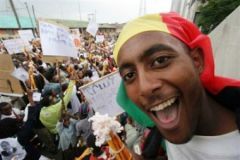Ethiopians march for peaceful polls
ADDIS ABABA, May 12 (AFP) — With Ethiopia’s weekend general election fast approaching, hundreds of government and opposition backers took to the streets of the capital on Thursday to urge a peaceful vote as plans for a polling day truce between the main rival parties hit a snag.

|
|
Supporters of Ethiopia’s ruling party the People’s Revolutionary Democratic Front hold a rally, Thursday, May 12, 2005 in the capital, Addis Ababa to express their support for fair and peaceful elections. The May 15 elections are considered an important test of the ruling party’s willingness to bring democracy to Ethiopia, which has invited international observers into the Horn of Africa country for the first time. (AP). |
The hitch in peace pact emerged as the most-high profile of the some 300 international monitors invited to observe the hotly contested vote, former US president Jimmy Carter, was due to arrive here and begin work on Friday.
Hundreds of activists, many of them supporters of the ruling Ethiopian People’s Revolutionary Democratic Front (EPRDF), marched in at least nine Addis Ababa neighborhoods carrying banners and signs dampened by afternoon shower.
“We need peace,” “We need a peaceful election day” “We need development,” and “We need peaceful reconcilation” and “Accept the verdict of the people,”
read placards waved by about 500 supporters of the EPRDF, which is heavily favored in Sunday’s vote.
The organized demonstrations, which also attracted some government foes, came as the country’s main opposition umbrella groups, the Coalition for Unity and Democracy (CUD) and the United Ethiopian Democractic Forces (UEDF) balked at signing a non-violence agreement with the EPRDF and other parties.
Mekonnen Wondmu, an official with the National Election Board of Ethiopia (NEBE), said the two groups wanted more time to look at the agreement and had also demanded that the EPRDF release dozens of jailed opposition supporters.
“The CUD and the UEDF requested more time to consult with their executive bodies and at the same time they asked the EPRDF to release their supporters who they believe are now behind bars,” he told AFP.
Neither group could immmediately be reached for comment and Wondmu could not say whether the prisoner release was a condition for them to sign the truce, but noted that such questions were government and not political matters.
“If there are any prisoners who support the CUD or UEDF they are in the hands of the police and the EPRDF has no right to intervene in the due process of the law,” he said.
In their absence, the EPRDF and 13 smaller parties signed the truce while waiting for the opposition’s decision.
Two weeks ago, both sides signed an accord that stipulated how both sides would behave during the campaign period, which is due end officially early Friday.
But Ethiopian Information Minister and EPRDF campaign spokesman Barakat Simon had late Wednesday announced with great fanfare that a new deal would be signed by all parties, including the main opposition groups, on Thursday.
The opposition, the CUD in particular, has made numerous well-publicized complaints about alleged ruling party harrassment and intimidation, some of them backed up by international observers.
But, the CUD had reacted positively to Barakat’s Wednesday announcement of the pact, calling it a matter of “great importance” but stressed it would be critical for the EPRDF to respect it.
For his part, Prime Minister Meles Zenawi, the EPRDF leader, has accuseed the opposition of fanning ethnic tensions in the run-up to the poll, warning that such activity could lead to violence like that seen in the 1994 Rwandan genocide.
The truce was in part formulated by the Addis Ababa-based foreign diplomatic corps and election observers, including the Carter Center, whose chief is due to begin inspecting Ethiopian polling facilities and meeting voters on Friday.
Sunday’s election will be Ethiopia’s third since Meles came to power with the ouster of a Soviet-backed dictatorship in 1991, its second since the advent of true multi-party politics and the first to be held under international scrutiny.
The campaign has been marked with unprecedented media access for the opposition, including equal time on state-run radio and television and the chance to participate in broadcast debates.
But Ethiopian authorities have been criticized by the opposition and rights groups for intensifying a crackdown on dissent in rural areas where 85 percent of Ethiopia’s 70 million inhabitants live in conditions of abject poverty.
About 26 million voters are registered for the election in which ballots will be cast for local assemblies and most of the 547 seats in the federal parliament, of which the EPRDF holds 481.
